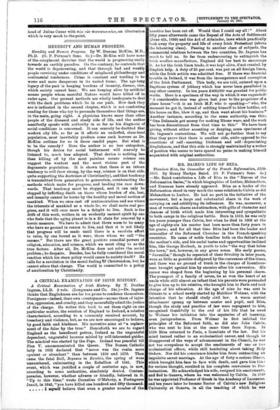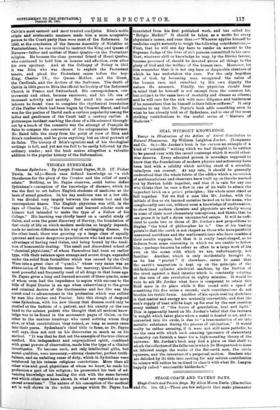MR. BAIRD'S LIFE OF BEZA.
Theodore Bc'ea, the Counsellor of the French Reformation, 1519- 1605. By Henry Martyn Baird. (G. P. Putnam's Sons. 6s) —Mr. Baird contributes a Life of Bezs, to the "Heroes of the Reformation Series," in which biographies of Luther, lllelanctlion, and Erasmus have already appeared. Beza as a leader of the Reformation stood in very much the same relation to Calvin as did Melancthon to Luther. He had no part in the initiative of the movement, but a large and substantial share in the work of carrying on and solidifying its influences. He was, moreover, a man of versatile charm and attraction, with gifts of character and chances of birth which made him interesting and sympathetic to both camps in the religious battle. Born in 1519, he was only ten years younger than Calvin, but when he died in 1605 at the age of eighty-six hie master had been more than forty years in his grave ; and for all that time Beza had been the leader and counsellor of the Reformed Churches in the French-speaking countries. He came of noble families both on the father's and the mother's side, and his social tastes and opportunities inclined him, like George Herbert, in youth to take "the way that takes the town," not, however, in any gross sense, His early poems, "Juvenilia," though he repented of their frivolity in later years, were as little as possible disfigured by the coarseness of the times, and there was no ground of truth in the charges of licentious- ness brought against him by enemies after his conversion. His career was shaped from the beginning by his personal charm. The youngest of a family of seven, he so won the heart of an uncle while still almost an infant that his parents were persuaded to give him up to his relative, who brought him to Paris and took charge of his education. At the age of nine he was sent to Orleans to a school newly started by Melchior Wolmar, with the intention that he should study civil law. A warm mutual attachment sprang up between master and pupil, and Beza, though the study and practice of law were repugnant to him, recognised thankfully to the end of his life that he owed to Wollner his initiation into the mysteries of all learning, even jurisprudence. From Wolmar he first imbibed the principles of the Reformed faith, as did also John Calvin, who was sent to him at the same time from Noyou. In 1539 Beza returned to Paris, a licentiate of the law. But his mind turned rather to an ecclesiastical career, and though he disapproved of the ways of advancement in the Church, he was not too scrupulous to accept the emoluments of one or two ecclesiastical offices, while still hesitating about taking Holy Orders. Nor did his conscience hinder him from contracting an impulsive secret marriage. At the age of forty a serious illness, which brought him face to face with death, and gave him tirn.! for serious thought, resulted in his complete conversion to Pro- testantism. He acknowledged his wife, resigned his emoluments, and fled to Geneva, where he was welcomed by Calvin. In 1549 he was appointed Professor of Greek in the Academy of Lausanne, and ten years later he became Rector of Calvin's new Religious University at Geneva, in all the teaching of which he was Calvin' most earnest and most trusted coadjutor. B4za's noble origin and aristocratic manners made him a more acceptable person to the Court party than were most of the Reformers. In 1560, at the conclusion of the famous Assembly of Notables at Fontainebleau, he was invited to instruct the King and Queen of Navarre—father and mother of Henri Quatre—in the Protestant religion. He became the close personal friend of Henri Quatre, who continued to hold him in honour and affection, even after his own apostasy. And at the Colloquy of Poissy in 1561 it was B6za who was chosen to explain the Protestant tenets, and plead the Protestant cause before the boy- King, Charles IX., the Queen - Mother, and the Court, the Cardinals, and the doctors of the Sorbonne. The death of Calvin in 1564 gave to Beza the official leadership of the Reformed Church in France and Switzerland. His correspondence, con- troversial and other, became enormous, and his life one of incessant activity and anxiety. But amid his more serious labours he found time to complete the rhythmical translation of the Psalter which had been begun by Clement Marot, and had won for the psalms of David such a curious popularity among the ladies and gentlemen of the Court half a century earlier. A picturesque incident marking the close of a life coloured through- out by a tom& of the romantic was the attempt of Francois de Sales to compass the conversion of the octogenarian Reformer. Mr. Baird tells the story from the point of view of B6za and Bess's confession, and he gives anything but an ideal portrait of de Sales. The history of Beza's opinions and of his theological writings is full, and yet not too full to be easily followed by the ordinary reader ; and the book makes altogether a valuable addition to the popular history of the Reformation.



















































 Previous page
Previous page